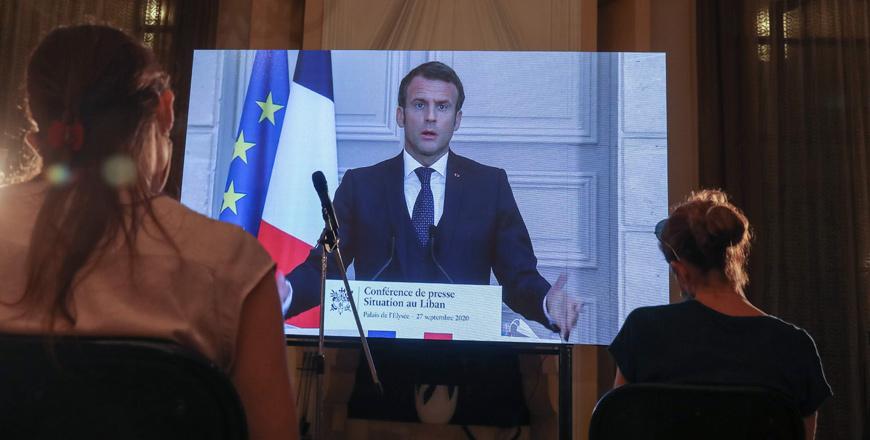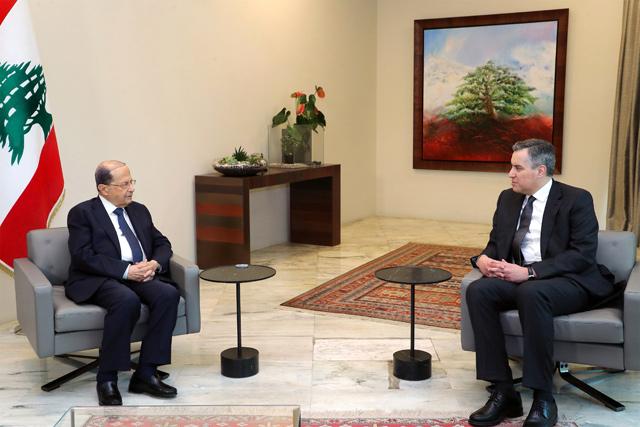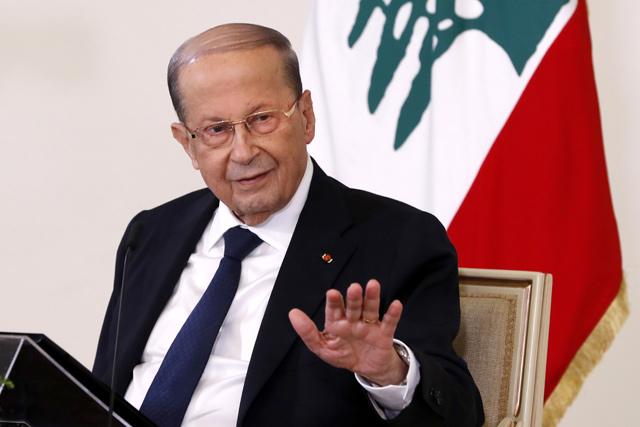You are here
Macron accuses Lebanon leaders of 'betrayal' over gov't failure
By AFP - Sep 29,2020 - Last updated at Sep 29,2020

French President Emmanuel Macron addresses Lebanese journalists during a virtual press conference broadcast at the Pine Residence, the official residence of the French ambassador, in the capital Beirut on Sunday (AFP photo)
PARIS — French President Emmanuel Macron on Sunday upped the pressure on Lebanon's leaders to form a government in the wake of the Beirut port blast, saying their lack of progress represented a "collective betrayal".
Lebanon remains mired in political economic crisis with no end in sight after its premier-designate stepped down on Saturday following the failure of talks to form a government, despite intense international scrutiny.
At a rare news conference devoted to Lebanon, Macron launched an extraordinary diatribe against a Lebanese political elite who he said had looked to their own selfish interests rather than those of their country.
"They have decided to betray this commitment [to form a government]," Macron told reporters, declaring he was "ashamed" of the country's leaders.
"I see that the Lebanese authorities and political forces chose to favour their partisan and individual interests to the detriment of the general interest of the country," he added.
Mustapha Adib's resignation on Saturday ended efforts to hammer out a reformist government in the wake of a colossal August 4 explosion in Beirut that killed 190 people, injured thousands and ravaged large parts of the capital.
Political parties had pledged in early September, during a visit to Lebanon by Macron, to form within two weeks a Cabinet of independent ministers tasked with ending the country's economic malaise.
Macron has visited the former French protectorate twice since the blast, meeting Hizbollah representatives during his last trip as he sought to bring all political sides behind a roadmap to lift the country out of crisis.
In August, he chaired a video conference that saw world leaders pledge more than $295 million) for the country.
'Collective betrayal'
Macron said none of the leaders of Lebanon — where in the wake of the 1975-1990 civil war power is traditionally shared between Shiites, Sunnis and Christians — had been up to the task.
“All of them bet on the worst case scenario for the sake of saving themselves, the interests of their family or their clan,” he seethed.
“I therefore have decided to take note of this collective betrayal and the refusal of Lebanese officials to engage in good faith.”
In Washington, a State Department spokesperson expressed “disappointed in Lebanon’s political class for not prioritising the people over petty politics”.
“Regrettably, notwithstanding the financial crisis and the port explosion, it remains business as usual in Beirut,” the spokesperson added.
Under the Lebanese constitution, the president must now hold further talks to nominate another prime minister to form a government, but it is a process that risks dragging out and even failing.
“I don’t expect a government anytime soon,” Sami Atallah, who heads the Lebanese Centre for Policy Studies, told AFP in Beirut.
“There was a chance, there was a lot of pressure to form a government and it didn’t happen,” he said.
Adib’s efforts were hampered by the claims of two Shiite formations, the Iran-backed Hizbollah movement, and its ally Amal, led by parliament speaker Nabih Berri, who demanded the finance portfolio.
According to observers, the Shiite allies dug in their heels after recent US sanctions were imposed on a minister of the Amal party and two companies affiliated with Hizbollah.
In a warning to Hezbollah, Macron said the group should “not think it is more powerful than it is”
“It must show that it respects all the Lebanese — and in recent days, it has clearly shown the opposite,” said Macron.
‘Last chance’
The roadmap for political and economic reform set out on his last visit to Beirut on September 1 was still on the table, but time was running out, he added.
“It is now up to Lebanese officials to seize this last chance themselves.”
The UN envoy to Lebanon, Jan Kubis, on Saturday had reacted with disbelief to the failure to form a government: “Politicians, have you really scuppered this unique chance created by France?”
Even before the devastating Beirut port blast, the country was mired in its worst economic crisis in decades, its entrenched political class facing widespread popular discontent.
After Lebanon defaulted for the first time on its sovereign debt in March, it turned to the International Monetary Fund, but those talks soon stalled.
Many fear the country is headed from bad to worse, with daily novel coronavirus infection figures on the rise and increasing security incidents reported in recent weeks
Related Articles
BEIRUT — Lebanon's premier-designate stepped down on Saturday, saying he had been unable to form a reform-minded government to lift the coun
BEIRUT — Crisis-hit Lebanon's next prime minister, the third in a year, will have to spearhead reforms and battle corruption, President Mich
BEIRUT — Lebanon was left reeling on Sunday without the slightest prospect of ending multiple crises, after its premier-designate stepped do














